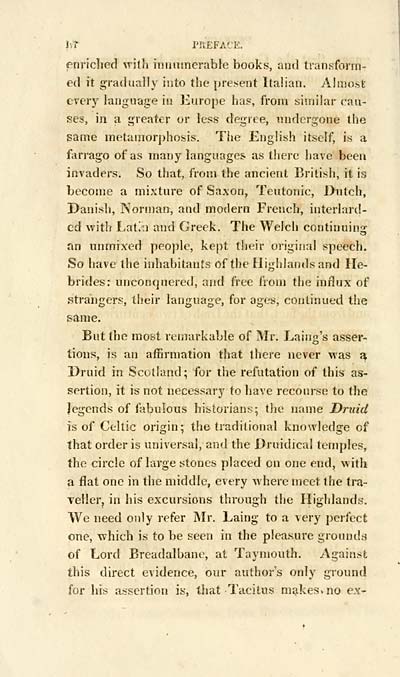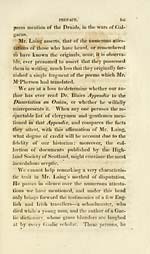Ossian Collection > Original collection of the poems of Ossian, Orrann, Ulin, and other bards, who flourished in the same age
(60)
Download files
Complete book:
Individual page:
Thumbnail gallery: Grid view | List view

IvT niEFACE.
pnricliecl ^Tilh innamerable books, iinil tianKform-
ed it gradually into the present Italian. Almost'
every language in Europe has, from similar cau-
ses, in a greater or less degree, undergone the
game mcitamorphosis. The English itself, is a
farrago of as many languages as there have been
invaders. So that, from the ancient British, it is
become a mixture of Saxon, Teutonic, Dutch,
Banish, Norn)an, and modern French, interlard-
ed with Lat>.i and Greek. The Welch continuing
rm unmixed people, kept their original speech.
So have the inhabitants of the Highlands and He-
brides: unconquered, and free from the influx of
strangers, their language, for ages, continued the
same.
But the most remarkable of Mr. Laing's asser-
tions, is an affirmation that there never was s^
Druid in Scotland; for the refutation of this as-
sertion, it is not necessary to have recourse to the
legends of fabulous historians; the name Druid
is of Celtic origin; the traditional knowledge of
that order is universal, and the Druidical temples,
the circle of large stones placed on one end, with
a flat one in the middle, every where meet the tra-
Teller, in his excursions through the Higlilands.
"VVe need ojily refer Mr. Laing to a very perfect
one, which is to be seen in the pleasure grounds
of Lord Breadalbaue, at Taymouth. Against
this direct evidence, our author's only ground
for his assertion is, that Tacitus mijikes^no ex-
pnricliecl ^Tilh innamerable books, iinil tianKform-
ed it gradually into the present Italian. Almost'
every language in Europe has, from similar cau-
ses, in a greater or less degree, undergone the
game mcitamorphosis. The English itself, is a
farrago of as many languages as there have been
invaders. So that, from the ancient British, it is
become a mixture of Saxon, Teutonic, Dutch,
Banish, Norn)an, and modern French, interlard-
ed with Lat>.i and Greek. The Welch continuing
rm unmixed people, kept their original speech.
So have the inhabitants of the Highlands and He-
brides: unconquered, and free from the influx of
strangers, their language, for ages, continued the
same.
But the most remarkable of Mr. Laing's asser-
tions, is an affirmation that there never was s^
Druid in Scotland; for the refutation of this as-
sertion, it is not necessary to have recourse to the
legends of fabulous historians; the name Druid
is of Celtic origin; the traditional knowledge of
that order is universal, and the Druidical temples,
the circle of large stones placed on one end, with
a flat one in the middle, every where meet the tra-
Teller, in his excursions through the Higlilands.
"VVe need ojily refer Mr. Laing to a very perfect
one, which is to be seen in the pleasure grounds
of Lord Breadalbaue, at Taymouth. Against
this direct evidence, our author's only ground
for his assertion is, that Tacitus mijikes^no ex-
Set display mode to: Large image | Transcription
Images and transcriptions on this page, including medium image downloads, may be used under the Creative Commons Attribution 4.0 International Licence unless otherwise stated. ![]()
| Early Gaelic Book Collections > Ossian Collection > Original collection of the poems of Ossian, Orrann, Ulin, and other bards, who flourished in the same age > (60) |
|---|
| Permanent URL | https://digital.nls.uk/77725465 |
|---|
| Description | Selected books from the Ossian Collection of 327 volumes, originally assembled by J. Norman Methven of Perth. Different editions and translations of James MacPherson's epic poem 'Ossian', some with a map of the 'Kingdom of Connor'. Also secondary material relating to Ossianic poetry and the Ossian controversy. |
|---|
| Description | Selected items from five 'Special and Named Printed Collections'. Includes books in Gaelic and other Celtic languages, works about the Gaels, their languages, literature, culture and history. |
|---|

